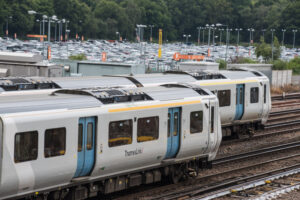
The government has admitted it is “unlikely” that legislation for Great British Railways (GBR) will be passed before the next general election.
Comments made today by transport secretary Mark Harper has poured cold water on a key pillar of planned government reforms.
GBR, first put forward by Boris Johnson in 2021, proposes the creation of a state-owned ‘guiding mind’ for Britain’s struggling rail sector, reducing fragmentation and government oversight.
The project, which is backed by rail operators and Network Rail, was included in the King’s Speech last week as part of a draft Rail Reform Bill.
But Harper told a Transport Select Committee hearing today: “It’s unlikely that we’ll be able to proceed to full legislation this session.”
Harper faced a grilling from committee chair Iain Stewart, who argued the legislation is “fairly simple” and that there had “already been a consultation on it.”
“Given the debate over it, I don’t think it is [simple]” Harper said. “There’s still quite a bit of difference of opinion about what people are trying to achieve with the legislation and there are different views from different parts of the industry,” he said.
Harper’s reluctance to commit to legislation comes amid concerns in the sector over delays to GBR’s roll-out.
Rail companies view it as a critical fix for Britain’s long-troubled railway service, which has never really got back to its best following the pandemic and is struggling with debt and costs.
GBR was included in last springs’ Transport Bill, but was axed in October by the then-transport secretary Anne-Marie Trevelyan.
Labour back rail reform but are expected to announce plans for full nationalisation in the coming weeks, a policy opposed by rail operators.
A slew of key industry figures and infrastructure groups wrote to the Prime Minister in May, urging him to not delay the roll-out any further or else risk business confidence.
Read more:
Rail legislation ‘unlikely’ before general election, government admits






